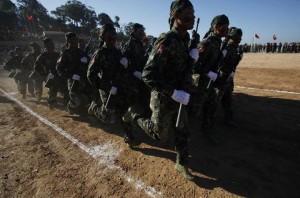Election Cancellations Create Further Doubt Over the Transparency and Credibility of Burma’s 2015 Elections
By Burma Partnership • November 3, 2015 On 27 October 2015, the Union Election Commission (UEC) announced that elections would be cancelled in four townships in Shan State as a result of the newly intensified fighting between the Burma Army and the Shan State Army-North (SSA-N). According to the Shan State Progressive Party, the political wing of the SSA-N, the Burma Army was seen to ramp up attacks against the SSA-N after they deliberated that they would not be signing the Nationwide Ceasefire Agreement.
On 27 October 2015, the Union Election Commission (UEC) announced that elections would be cancelled in four townships in Shan State as a result of the newly intensified fighting between the Burma Army and the Shan State Army-North (SSA-N). According to the Shan State Progressive Party, the political wing of the SSA-N, the Burma Army was seen to ramp up attacks against the SSA-N after they deliberated that they would not be signing the Nationwide Ceasefire Agreement.
With these additional cancellations, a total of seven townships in Shan State have been declared to be unfit for the elections. Meanwhile, in Karen State, the election commission has cancelled elections in 102 villages based on non-transparent security concerns. The UEC had previously called for the cancellation of elections in almost 600 village tracts, with Kachin and Shan State bearing the brunt of the losses. The Myanmar Times has noted that these cancellations top those of the 2010 elections, in which elections were halted in only 478 village tracts.
In addition, the UEC had previously attempted to delay elections due to last August’s flooding and landslides.
The cancellations in certain regions of Burma has already prompted controversy, with some critics speculating whether the cancellations will serve to ensure a victory for the military-backed, Union Solidarity and Development Party in the upcoming elections. A report from the Transnational Institute (TNI) has noted that current election rules require that a constituency has a voter turnout of at least 51% for the polling to be considered valid. TNI points out that cancellations may occur in only certain regions, allowing other areas under the same constituency to continue voting so long as they surpass the 51% threshold; which could potentially influence which candidate succeeds. It is exactly this type of voter manipulation that has a number of ethnic political parties concerned that they will be pushed out of the upcoming elections.
The move has already drawn international criticism, as a recent statement by the UN Special Rapporteur on the situation of human rights in Burma, Yanghee Lee, condemned the cancellation of voting rights “without due process.” In a somber warning for the international community to hold the Burma Government accountable, Lee stated, “The period after the elections, prior to the election of a new President and the formation of a new Government, may see instability and tension if the election outcomes are not widely accepted as credible and legitimate.”
Similarly, a report from the Carter Center has demanded that the UEC display greater transparency when choosing to cancel elections by making the criteria for a cancellation public.
Considering last week’s issues surrounding advance voting, the continuing saga of incorrect voter lists, the denial of voting rights for the Rohingya, the difficulties faced by migrant workers when voting, and the neglect shown towards the voting rights of internally displaced persons, it is hard to view the cancellations as anything other than an attempt to further disenfranchise Burma’s voters. Unfortunately, both the Burma Army and the UEC are contributing towards this disenfranchisement in an apparent disregard for a transparent and credible electoral process.
As tensions mount leading up to the 2015 elections, the Burma Army must refrain from stoking violence in regions, which may result in further voting cancellations. The UEC, conversely, can mitigate the concern of voters and election observers that they are manipulating the electoral process by providing transparency regarding their decision to issue election cancellations. Finally, the international community – through electoral observations and external pressure – must ensure that the Burma Government is fully committed to the democratic process, and that the elections are not falling short of international standards.
Tags: 2015 Elections, Advance Voting, Burma Partnership, Human Rights, Rohingya, Transnational Institute, Union Solidarity and Development PartyThis post is in: 2015 Burma Elections, Blog
Related PostsArmed Forces and Democratization in Myanmar: Why the U.S. Military Should Engage the Tatmadaw
Burma: Country Reports on Human Rights Practices for 2015
Report of the Special Rapporteur on the situation of human rights in Myanmar
Atrocities Prevention Report: Targeting of and Attacks on Members of Religious Groups in Burma
The 2015 Elections and Beyond: Perspectives from villagers in rural southeast Burma/Myanmar









 All posts
All posts